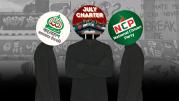Some cracks seemed to have appeared in the shaky consensus between political parties as the final draft of the July Charter looms. Meanwhile, police sounded out a warning of anarchy lying in wait in the days ahead.
Dhaka Stream's morning brief aims to help you get up to speed on yesterday's top events, so that you know what to expect today.
Political parties give draft July Charter the cold shoulder
The drama surrounding the draft of the July Charter reached a fever pitch yesterday as multiple political parties voiced their concerns, one day after it had been handed out at a meeting of the National Consensus Commission.
Why it matters:
The July Charter is being drafted through a consensus with all political parties. However, as in any such case, those parties may be letting competing interests take precedence over true reform to the state.
So far, only a draft of the charter has been released. Yet, the National Consensus Commission says the document is close to being finalised, a source of major confusion.
This has led many political leaders to complain that they were not properly consulted.
Jamaat-e-Islami's Nayeeb-e-Amir Amir Syed Abdullah Mohammad Taher called the draft "incomplete" and cautioned that it contained "dangerous elements".
"If it's merely a sample, no comment is needed. But if this represents the final version, we categorically reject it," he said.
Discontent around the July Charter has been simmering for months, especially in the ranks of the National Citizen Party.

The Bangladesh Jamaat-e-Islami and National Citizens' Party (NCP) have raised objections to the draft of the July Charter, terming it incomplete and even dangerous. Dhaka Stream explores what has gone wrong
Convenor Nahid Islam slammed the government's failure to pen the document by July as a "failure", and has warned that if the document does not guarantee reforms, his party would refuse to endorse it.
NCP Joint Convener Javed Rasin echoed those sentiments yesterday, saying, "It remains a draft document which the party is currently reviewing. We expect to see all fundamental reform issues included in this draft. If any are omitted, we will deliberate in party forums before deciding whether to endorse it."
The fact that the BNP staged a walkout on July 28 suggests that contentious issues remain on their end as well.
The bigger picture:
Given the significant role played by the general public in the mass uprising that ousted the Awami League government – an achievement this document aims to enshrine – political parties have been left worried that all they will be left with is a wooden spoon.
They demand that their contributions be recognised. Another sticking point is that no party is favoured unduly by the charter's content.
According to reports, this boiled over into the drafting process as early as when the first draft was handed out, where it was mentioned that the "leadership" of the students had led to the AL's ouster.
In the second draft, the term "leadership" was changed with "call".
Rashed Khan, general secretary of the Gono Odhikar Parishad, said in no uncertain terms yesterday that the draft was biased.
"This charter distorts history. We do not accept this charter. The draft has been made to favour the NCP. This charter must be amended. If the charter is not changed, the Gono Odhikar Parishad will not sign it."
Despite these misgivings, the NCP itself is dissatisfied.
"We strongly oppose this. There has not even been a discussion on how the dialogue will proceed, yet they have published a draft. We cannot accept this," Joint Convener Rasin said.
Police fray nerves with advance warning of anarchy
Fascist powers could create anarchy across the country as the first anniversary of the July Uprising draws nearer, prompting police across the country to adopt special measures.
However, if the announcement was intended to quell fears, it did quite the opposite, with the general populace now unsure of what awaits.

Authorities marked it as a particularly sensitive period, fearing sabotage by exiled fascist groups
Zoom In:
A report by the police's Special Branch (SB) on Monday revealed its worries of "fascist" elements lurking to disrupt celebrations, flagging the period from July 29 to August 8 as particularly sensitive.
The report warns that fascist elements may attempt to incite nationwide unrest through online and offline disinformation campaigns, disruptions to anti-fascist programmes, and other activities aimed at destabilising law and order.
As such, until August 8, the SB has instructed police to conduct special raids, stop and search suspicious individuals and vehicles, ensure security around transport hubs such as docks, railway stations, and airports and intensify mobile patrols.
The bigger picture:
Whenever the police have spoken of large-scale raids, even law-abiding citizens have reason to pause.
In most cases, such raids have often seen arrests of thousands, with little evidence that has been made public.
'Operation Devil Hunt', which Home Affairs Adviser Md Jahangir Alam Chowdhury said would "carry on until every devil is held accountable", has led to the arrests of over 12,000 people so far since being launched in February.
Now, ordinary citizens are not only worried about potential threats, but about how they will be impacted by the response to those lurking dangers.
Making things even more murky, IGP Baharul Alam told reporters yesterday that he had not heard of any such directive. "I am not aware of any special 11-day instruction regarding law and order. Of course, July and August are always sensitive months, but nothing specific has come to my attention."



Comments